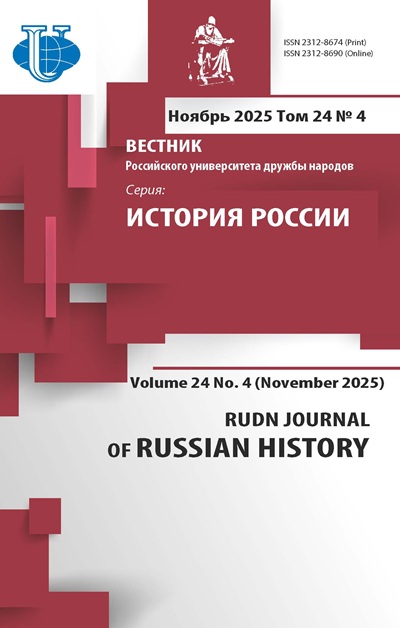СОЦИАЛЬНАЯ ДЕЯТЕЛЬНОСТЬ ПРИХОДСКОГО ДУХОВЕНСТВА В УСЛОВИЯХ ОГОСУДАРСТВЛЕННОЙ ПРАВОСЛАВНОЙ ЦЕРКВИ В РОССИЙСКОЙ ИМПЕРИИ XIX В.
- Авторы: Зубанова С.Г.1
-
Учреждения:
- Российский государственный социальный университет (филиал в г. Люберцы)
- Выпуск: № 4 (2014)
- Страницы: 145-156
- Раздел: СТАТЬИ
- URL: https://journals.rudn.ru/russian-history/article/view/4259
- ID: 4259
- Дата ретрагирования: 27.11.2017
- Причина ретрагирования:
Ретракция публикации обусловлена выявлением избыточного самоцитирования из монографии автора: Зубанова С.Г. История социальной работы: Исторический опыт социальной деятельности Русской Православной Церкви в синодальный ХIХ век. – М.: Издательство РГСУ, 2007. – 300 с.
Статья ретрагируется (отзывается из печати) по инициативе автора главным редактором (Протокол заседания редакционной коллегии журнала № 3 от 27 ноября 2017 г.) с согласия издателя
Цитировать
Полный текст

Аннотация
В статье исследуется опыт имперской России XIX в. в создании условий для социальной деятельности приходов Русской Православной Церкви (РПЦ). Рассматриваются формы служения РПЦ, направленные на оказание помощи нуждающимся, а также исторические уроки социальной практики РПЦ. В статье обосновывается, что социальная деятельность церкви не должна мешать ее основным религиозным функциям, а партнерские отношения государства и РПЦ в социальных проектах должны способствовать улучшению жизни народа и его духовно-нравственному росту.
Об авторах
Светлана Геннадиевна Зубанова
Российский государственный социальный университет (филиал в г. Люберцы)
Email: svet_285@mail.ru
Кафедра социальной работы
Список литературы
- Свод Законов Российской империи. - СПб., 1842. - Т. 1. - Ч. 1. - С. 42.
- Дорская А.А. Государственное и церковное право российской империи: проблемы взаимодействия и взаимовлияния. - СПб., 2004.
- Семашко А.Г. Современные тенденции в практике правового регулирования государственно-церковных отношений // Теодицея. Альманах. - Пятигорск: ПГЛУ, 2013. - № 4. - С. 68.
- Пашенцев Д.А. Благотворительная деятельность Русской православной церкви во второй половине XIX - начале XX века.: Дис. … канд. ист. наук. - М.: РГСУ, 1995.
- Зубанова С.Г., игумен Лука (Степанов), Патюлина Н.Д., Рузанова Н.П. Социальное служение Русской Православной Церкви: вопросы истории, теории и практики. - М., 2013. - С. 21.
- Нижегородские Епархиальные Ведомости. - 1891. - № 17.
- Государственный архив Российской Федерации (ГА РФ). - Ф. 663. - Оп. 1. - Д. 230. - Л. 5.
- Отдел рукописей Российской государственной библиотеки (ОР РГБ). - Ф. 275. - К. 34. - Д. 35. - Л. 16.
- Там же. - Ф. 213. - К. 2. - Д. 9. - Л. 8.
- Бочечкаров Н. О нищенстве и разных видах благотворительности / Архив исторических и практических сведений по России. - СПб., 1859. - С. 10.
- Гиляров-Платонов Н.П. Вопросы веры и церкви // Сб. ст. 1868-1887 гг. - М., 1906. - Т. 2. - С. 108.
- Собрание узаконений. - 1864. - № 78.
- Благотворительная Россия. - СПб. - Т. 1. - Ч. 1. - С. 15.
- Отчет Покровского Попечительства (1893-1896 гг.). - М., 1897. - С. 2.
- Зубанова С.Г. История социальной работы: исторический опыт социальной деятельности РПЦ в синодальный XIX век. - М., 2007. - С. 110.
- Зубанова С. Социальное служение Русской православной Церкви в XIX веке. - М., 2009. - С. 87.
- Никольский А.Н. Церковно-общественные вопросы о приходских попечительствах // Православное образование. - 1879. - С. 151.
- Статистика приходской благотворительности Москвы // Детская помощь. - 1885. - С. 3.
- Вестник благотворительности. - 1899. - № 1. - С. 2.
- Зубанова С. Социальное служение в России: исторический опыт, теоретические основы, современная практика. - М., 2013. - С. 131.
- Обзор социально-экономического устройства в дореволюционной России // Социальное обеспечение. - 1990. - С. 1.
- Православное обозрение. - 1874. - С. 389.
- ОР РГБ. - Ф. 213. - К. 107. - Д. 47. - Л. 4.
- Центральный государственный исторический архив в г. Москве (ЦГИАМ). - Ф. 62. - Оп. 1. - Д. 7448. - Л. 4.
Дополнительные файлы















